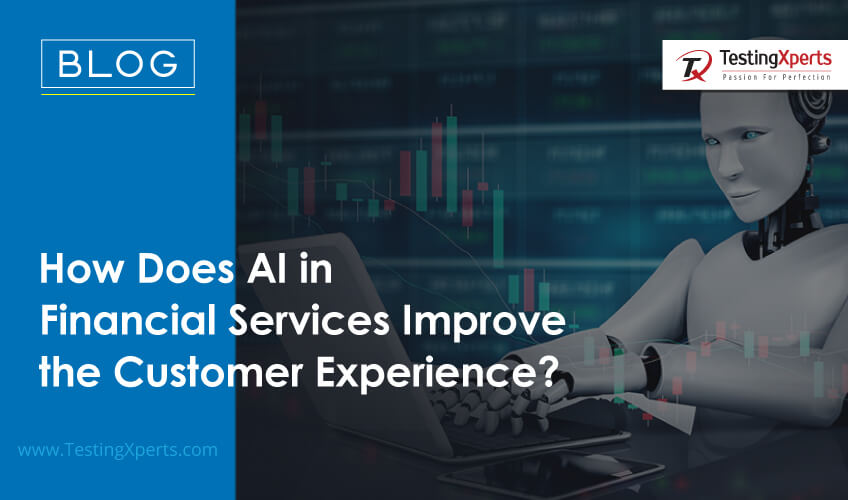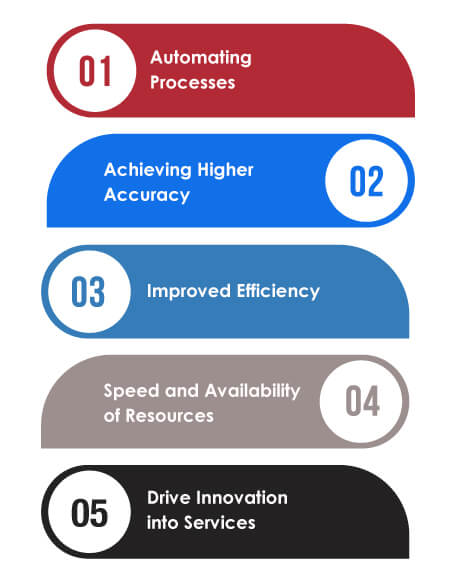Recommended Blogs
How Does AI in Financial Services Improve the Customer Experience?
By Bharath Babu - Read time: 1 minute

Table of Contents
- Overview of AI in Financial Services
- How is AI used in the Finance Industry?
- Examples of AI in the Finance Sector
- Benefits of Using AI in the Financial Services Sector
- Conclusion
- How can TestingXperts Help with AI Testing?
The Financial services sector is undergoing a transformative change with the advent of AI, taking organizations through multiple levels of digitization. This technology is necessary to address various challenges in the finance sector, such as enhancing customer experience, improving efficiency, digitizing processes, and providing personalized financial solutions. According to a report, banks can achieve up to fivefold increase in transactions with the same headcount by using AI-based tools. Financial organizations will benefit most from AI as they have a lot of data, which is the core need for this technology.
The integration of AI/ML in financial services is not new. For example, payment companies have been using ML to analyze and prevent unsecured or fraudulent transactions for the last few years. The transformation of computing power and increased storage now facilitates real-time detection capabilities. Over the years, financial institutions and regulators have been working to refine AI regulations and ensure secure and seamless integration.
Overview of AI in Financial Services
AI use in the financial industry encompasses various applications, such as complex data analysis and risk management, automated user support etc. This technology is redefining how financial institutes should operate and serve their customers. AI Chatbots or virtual assistants are good examples of how AI is used in financial services to handle customer inquiries. They provide efficient and quick responses to common queries, enabling employees to handle other complex tasks. AI also enables better decision-making based on real-time data analysis. As financial companies deal with massive datasets, AI algorithms make extracting valuable information from such datasets easier. This results in better fraud detection, enhanced risk assessment, improved customer experience, and personalized advice.
AI also helps analyze market trends, automate routine tasks, and keep up with rapidly evolving regulatory compliance. It also automates the reporting and monitoring processes to ensure that finance businesses comply with regional regulations and avoid legal and financial penalties.
How is AI used in the Finance Industry?
Artificial intelligence in the finance sector helps by providing more accurate, efficient, and personalized services. It enables transparency and compliance, reduces costs, and automates business operations. AI in the finance sector helps in the following areas:
• AI-powered tools like ClickUp, Alter AI, etc., help in portfolio management by customizing investment solutions based on risk profiles and financial goals per user. These tools monitor market trends in real time and adjust investment strategies to ensure optimal portfolio performance.
• Another use of AI in financial services is for high-frequency trading or Algorithmic trading. AI algorithms analyze the stock market conditions and execute trades much faster than human traders. It results in capitalizing on stock market opportunities quickly and attaining significant profits.
• It helps in fraud detection and prevention by analyzing transaction patterns and identifying anomalies. Its proactive approach to monitoring transactions protects banks and their customers from cyber threats and fraud.
• AI algorithms help in analyzing large datasets to uncover patterns of potential risks. In finance, it is known as risk assessment for loan approvals and investments. With AI, financial institutes can make better decisions, reduce the risk of losses, and improve the risk assessment process.
• One of the common uses of AI in financial services is customer service, in which banks utilize AI-powered chatbots to handle routine inquiries and transactions. AI tools quickly process and revert to customer queries and provide instant support by replacing manual processes.
• AI improves the efficiency and accuracy of credit scoring by replacing traditional credit scoring methods, which are biased and limited.
Examples of AI in the Finance Sector

AI enables the banking and finance sectors to meet customers’ demands with a smarter, safer, and more convenient approach, enabling them to spend, invest, and save money. The market value of AI in financial services is expected to grow 16.5 percent by 2030, which was $9.45 billion in 2021. Here are the key examples of how AI is used in the finance industry to enhance customer experience:
DataRobot AI Platform:
It offers ML software for business analysts, executives, and data scientists, enabling financial institutes and businesses to build accurate predictive models. DataRobot helps identify decision-making issues like direct marketing, fraudulent credit card transactions, blockchain, etc. Lending firms use DataRobot for underwriting by analyzing customer default rates.
Zest AI:
It is an AI-enabled underwriting platform that allows finance businesses to assess borrowers with little to no credit history. The platform analyzes thousands of datasets and gives lenders transparency and better access to borrowers’ credit information.
Scienaptic AI:
This platform offers multiple financial-based services to provide banks and financial institutions with more transparency. Its underwriting platform uses adaptive AI models, records, and non-tradeline data to create predictive intelligence for credit decisions.
AlphaSense:
It is an AI-enabled search engineer for investment firms, banks, and Fortune 500 companies. The platform uses NLP to analyze keyword searches to identify trends and changes in the financial markets. AlphaSense provides traders and brokers access to global filings and the SEC, gaining information and call transcripts on both public and private companies.
Abe.ai:
It is a virtual financial assistant and can easily integrate with the web, mobile, Amazon Alexa, and Google Home to provide users with personal banking experience. Abe.ai services range from knowledge and support requests to planning budgets and personalized financial management.
Vectra AI:
Vectra AI is an AI-powered cyber-threat detection platform. It allows financial institutes to automate threat detection, identify attackers, accelerate response after incidents, and check vulnerable data. It also helps identify weaknesses and prevent cyberattacks.
Darktrace:
The Darktrace AI/ML platform analyzes network data to create probability-based calculations and detects suspicious activities before they cause damage to financial companies. Businesses also implement this solution to prevent impersonation and malware attacks, as it helps decrease email attacks.
Benefits of Using AI in the Financial Services Sector

By integrating AI into financial services, businesses can optimize their current operations and improve the efficiency of customer-focused solutions. As this sector relies on massive datasets, deploying AI-based solutions can help analyze data more effectively, resulting in informed decision-making, reduced risks, and enhanced customer experience. Here are some of the benefits of using AI in the financial services sector:
Automating Processes:
AI automates processes and workflows, improving decision-making and service delivery. For example, AI can automate the cybersecurity process for a payment provider by continuously monitoring network traffic. It can also enhance the client-first approach for banks by offering a flexible and personalized banking experience to fulfill user requirements more securely and faster.
Achieving Higher Accuracy:
AI enables financial services organizations to decrease manual errors in data analytics, document processing, onboarding, data processing, etc. Its deep analysis helps achieve higher decision-making accuracy and adjust to rapidly changing market and customer needs.
Improved Efficiency:
Using AI to perform repetitive tasks, businesses can focus on more strategic activities. Financial organizations can use AI to automate processes like verifying documents, translating phone calls into reports, or answering common user queries. Replacing humans with AI for routine tasks is a great alternative to achieve higher efficiency.
Speed and Availability of Resources:
AI processes information faster than humans and finds patterns between data commonly missed by the human eye. It leads to quicker insights to facilitate trading communications, compliance management, decision-making, and more. With AI, financial organizations can help their users complete financial tasks and manage their finances whenever and from wherever they are.
Drive Innovation into Services:
AI’s ability to analyze large datasets enables companies to develop unique and innovative services and products to satisfy customers evolving needs. For example, AI predictive analysis can modernize the insurance customer experience without compromising the human touch.
Conclusion
By integrating AI, financial organizations can improve transaction processes, offer personalized financial services, enhance fraud detection capabilities, enhance customer experience, and improve business efficiency. Along with automation, AI facilitates data-driven decisions and market trend analysis, leading to better risk management. But, to leverage the complete benefits of AI, one needs a robust QA solution to improve the efficiency and quality of the AI-based software integration process. AI has limitless potential to shape a smarter, customer-centric, and safer future in finance, and implementing AI testing solutions can help scale it to new heights.
How can TestingXperts Help with AI Testing?
As financial organizations strive to accelerate the testing process of their AI-based software, TestingXperts, a leading AI testing company, has developed a robust and comprehensive testing strategy for AI systems. By partnering with us, you can expect:
• Accelerated testing with reduced test execution time and quick identification of defects, expediting the testing process.
• Significant expertise in tools geared explicitly toward intelligent automated continuous testing.
• Experience enabling CI/CD pipelines using our in-house accelerator TxDevOps and industry-standard tools.
• 30+ years of collective experience in utilizing various tools to provide intelligent automation solutions to handle AI testing complexities.
• One hundred test consultants specializing in next-gen testing tools to address evolving AI testing requirements.
• Flexibility in project execution and availability with a global presence in the USA, Canada, UK, and India, ensuring efficient service delivery and collaboration.
• Ability to harness AI for test automation using partner tools and in-house accelerators, enabling the delivery of advanced AI testing solutions tailored to your needs.
To know more, contact our QA experts now.
Discover more

